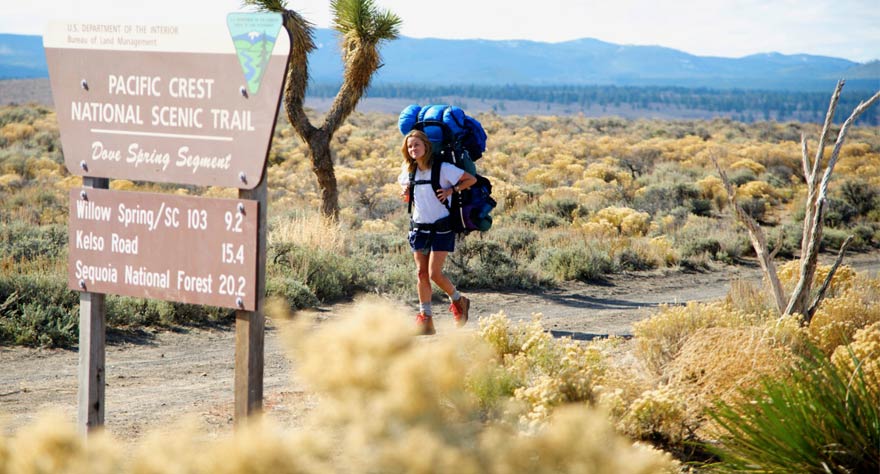
Reese Witherspoon's performance universalizes this tale of self-acceptance on the Pacific Crest Trail.

Reese Witherspoon's performance universalizes this tale of self-acceptance on the Pacific Crest Trail.
The journey of a thousand miles begins with an oversized backpack and a boot thrown off a mountain. Or at least that’s how Wild begins, the adaptation of Cheryl Strayed’s memoir recounting her decision at 26 to hike the Pacific Crest Trail in an attempt to face the person she’d become. In the film’s opening scene, Cheryl—played with straightforward vulnerability by Reese Witherspoon—sits atop a mountain crest and sings a line from Simon and Garfunkel’s “El Condor Pasa”, her bloody and exposed foot reveals a toenail barely holding on. “I’d rather be a hammer than a nail,” she whispers as she rips the toenail off, rocking backward in pain and incidentally knocking her boot off the mountain. So she takes the other boot off, throws it after its partner and screams in rage. And that’s Cheryl. One part sheer determination, two parts anger.
Wild falls into the same vein as other find-thyself-in-nature style movies, like Into the Wild, with a few of the same frustrations attached. Primarily the scenario of people facing nature with very little experience in naïve attempts to prove themselves. Oh, how nature loves to laugh at such people. It’s hard to be prepared for the harshness of the outdoors while navel-gazing ones way to personal peace and acceptance. I fully expected to find myself annoyed with Cheryl, but here is where director Jean-Marc Vallée proves his worth in his ability to take true-life characters with rough edges and paint them on to the screen in colors that attract and stir emotional identifiability.
Last year Vallée gave us Dallas Buyers Club, a remarkable bio-pic that earned Matthew McConaughey his first Oscar. The same grasp on perspective he offered last year on a feisty HIV survivor in 1980s Texas, he wields delicately in Wild. The film doesn’t follow a clear line of action, allowing Cheryl’s journey to pull from her the pieces of her past that brought her to her present. In fact, much of the film is her daily routine. Packing up, hiking for miles alone, and setting up camp each night. As she hikes memories from her past surface giving us insight into not necessarily what led to her self-destructive behavior, but how at rock bottom a few months alone in the wilderness seemed as good a way as any to wipe a slate clean.
These memories include many of her mother Bobbi, who raised Cheryl and her brother on her own after escaping an abusive marriage. Bobbi is played by Laura Dern with an uninhibited sense of wonder and optimism that is never idealistic. Bobbi’s wisdom often comes back to her, her mother’s mantra pushing her forward, urging Cheryl to put herself “in the way of beauty.” The loss of her mother to cancer only a few years previous to her hike is clearly a pain she carries, but doesn’t seem to be the reason for Cheryl’s string of rash behavior, including habitually cheating on her seemingly wonderful husband (Thomas Sadoski) and falling in with heroin users. When her escapist behavior leads to an unwanted pregnancy—and the rare scenes we get with Gaby Hoffman as her best friend—Cheryl rashly attaches herself to the nearest wild idea in the form of a pamphlet for the PCT.
Both Witherspoon and Dern are likely to gain some much deserved awards recognition for their roles, especially impressive for Dern who doesn’t actually have that much screen time. But Witherspoon is the one who carries the film with the same fortitude she portrays hauling Cheryl’s comically huge backpack. Narration interspersed throughout the film with Cheryl’s complaints about her bruises, her food options, her varying levels of fatigue, and of course her emotional breakthroughs, are all inserted in an unobtrusive manner and spoken by Witherspoon with no hint of overt sentimentality.
With cinematographer Yves Bélanger on his side, Vallée certainly gets some exceptional footage of the PCT, but there’s hardly a nature shot that doesn’t place Cheryl squarely in the middle of it. The story is hers, and her setting, while gorgeous, is the static unchanging constant that provides her a way to focus in the midst of her tailspin. Nature is of course quite treacherous, but she faces each hardship with the determination that nothing could be more dangerous than the danger she poses herself. She encounters several people in her journey, some of them providing clear examples of the added pressure to be a single woman, vulnerable on the trail (not to mention in life). An interaction with two hunters in a scene in the woods is especially chilling. Nick Hornby adapted the novel for screen, and he excellently weaves Cheryl’s solitude, memories, and interactions along a wayward path, that while not always logical, helps prove Cheryl’s point that we aren’t only the sum of our experiences, in our ‘now’ we’re the interpretation of those experiences.
Wild is funny, harrowing, gritty, and should resonate with anyone who’s had any shred of self-doubt. Those looking for a survival tale will find a decidedly more contemplative story, where surviving one’s own condemnation proves at least equally as challenging as battling the elements.
As a woman who changed her last name to Strayed after her divorce as some sort of personal penance, Cheryl Strayed is clearly the sort of woman who would always need to be loud and explicitly honest about her transformation to feel complete in it. And so she must find it comforting to know her portrayal on-screen holds an amplifier to her story and universalizes it for anyone who’s needed to find their own freedom and the strength to accept themselves.